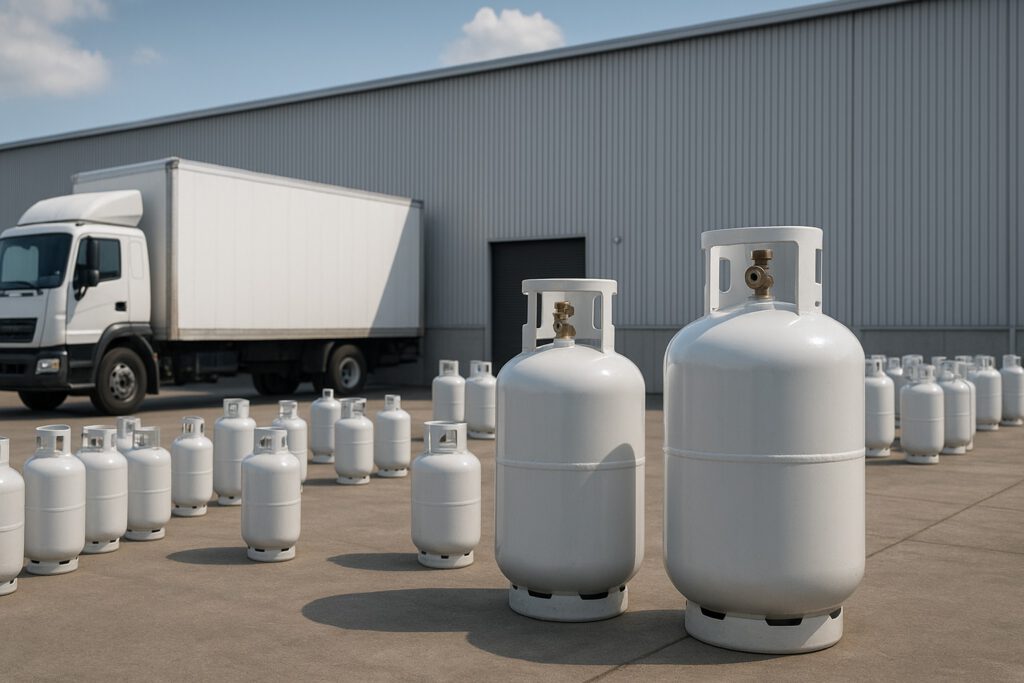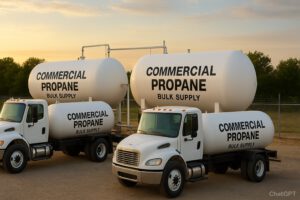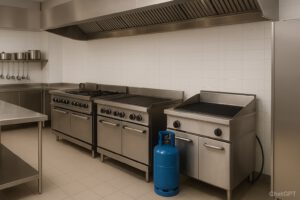
Commercial propane cylinders serve as the backbone of countless business operations, providing portable, reliable fuel for applications ranging from food service and construction to industrial processes and emergency power. Understanding cylinder types, regulatory requirements, and safety protocols ensures businesses maintain compliance while maximizing operational efficiency.
From DOT-approved transportable cylinders to ASME-certified stationary tanks, commercial propane cylinders offer the flexibility and performance that modern businesses demand for fuel-dependent operations.
Types of Commercial Propane Cylinders
Commercial propane cylinders come in various sizes and designs, each suited for specific business applications and regulatory requirements.
DOT-Approved Transportable Cylinders
Department of Transportation approved cylinders are designed for safe transportation and are the most common type used in commercial applications.
Standard Sizes and Capacities
- 20 lb cylinders: Most common for small commercial applications ($20-$30 each)
- 30 lb cylinders: Popular for restaurants and light industrial use ($25-$40)
- 40 lb cylinders: Heavy-duty applications with increased capacity ($35-$50)
- 100 lb cylinders: Commercial-grade for frequent high-volume use ($60-$80)
- 420 lb cylinders: Large transportable cylinders for major operations ($200-$300)
Cylinder Construction Features
- Steel construction: Durable, corrosion-resistant materials
- Pressure relief valves: Automatic safety pressure release
- Service valves: Standard POL or ACME connections
- Foot rings: Stability and handling protection
- Color coding: Industry-standard propane cylinder colors
ASME-Approved Stationary Cylinders
American Society of Mechanical Engineers certified cylinders are designed for permanent installation and larger capacity storage.
Stationary Cylinder Options
- 500 lb cylinders: Commercial installations with higher capacity ($400-$600)
- 1,000 lb cylinders: Industrial applications requiring bulk storage ($700-$1,000)
- Above-ground installations: Easy access and maintenance
- Underground installations: Property aesthetics and weather protection
Stationary System Features
- Foundation requirements: Stable mounting and earthquake resistance
- Vaporizers: Converting liquid propane to vapor for appliances
- Multiple valve options: Emergency shutdown and pressure regulation
- Monitoring systems: Level indicators and leak detection
Commercial Applications and Uses
Commercial propane cylinders power a wide range of business operations, from food service to industrial processes and emergency preparedness.
Food Service and Hospitality
Restaurants, hotels, and catering operations rely on propane cylinders for consistent cooking performance and backup power.
Restaurant Applications
- Commercial ranges and grills: Primary cooking equipment
- Oven systems: Baking and roasting operations
- Fryers and steamers: High-heat food preparation
- Emergency generators: Backup power for critical operations
- Outdoor cooking stations: Patios and special events
Hotel and Resort Uses
- Commercial laundry: High-temperature washing and drying
- Pool heating: Year-round swimming comfort
- Emergency power: Critical system backup
- Spa and wellness facilities: Steam rooms and therapeutic equipment
Construction and Industrial
Construction sites and industrial facilities use propane cylinders for portable power and specialized equipment.
Construction Applications
- Portable heaters: Job site heating and drying
- Welding and cutting torches: Metal fabrication operations
- Concrete curing: Accelerated concrete drying
- Temporary power generation: Backup electricity for tools
- Road construction equipment: Asphalt heating and maintenance
Industrial Operations
- Forklift power: Warehouse and material handling
- Process heating: Manufacturing and production
- Emergency backup systems: Uninterruptible power supplies
- Laboratory equipment: Research and testing applications
Agricultural and Farm Use
Farm operations utilize propane cylinders for equipment power and specialized agricultural applications.
Farm Equipment
- Grain drying systems: Post-harvest crop processing
- Irrigation pumps: Water system power
- Milk cooling systems: Dairy farm operations
- Greenhouse heating: Controlled environment agriculture
- Portable welding: Equipment repair and maintenance
Regulatory Compliance and Standards
Commercial propane cylinders must comply with comprehensive federal and state regulations to ensure safety and environmental protection.
DOT Regulations for Transportable Cylinders
Department of Transportation regulations govern the transportation, storage, and use of propane cylinders.
DOT Cylinder Requirements
- Periodic retesting: Hydrostatic testing every 5-10 years
- Visual inspections: External damage and corrosion checks
- Pressure testing: Burst pressure verification
- Documentation: Test date stamps and certificates
- Age limitations: Maximum service life restrictions
Transportation Rules
- Proper securing: Safe loading and restraint requirements
- Vehicle restrictions: Commercial vehicle certifications
- Emergency response: Spill and leak procedures
- Placarding: Hazard identification requirements
- Driver training: Hazmat transportation certification
NFPA and OSHA Standards
National Fire Protection Association and Occupational Safety and Health Administration standards ensure workplace safety.
Safety Standards
- Storage requirements: Cylinder separation and ventilation
- Installation clearances: Minimum distances from ignition sources
- Emergency equipment: Fire extinguishers and first aid supplies
- Employee training: Safety procedures and emergency response
- Inspection schedules: Regular maintenance and testing
Facility Requirements
- Building codes: Local fire and building regulations
- Permitting: Installation and operational approvals
- Environmental compliance: Emission and disposal regulations
- Insurance requirements: Coverage for propane operations
Cylinder Exchange Programs
Cylinder exchange programs provide businesses with seamless fuel access while ensuring regulatory compliance and cost efficiency.
How Exchange Programs Work
Exchange programs eliminate the need for businesses to maintain their own cylinder inventory and testing schedules.
Exchange Process
- On-site exchange: Quick cylinder swaps in under 30 seconds
- Pre-filled cylinders: Always ready for immediate use
- Inventory management: Supplier handles all cylinder tracking
- Emergency service: 24/7 access to replacement cylinders
- Quality assurance: All cylinders meet DOT standards
Program Benefits
- No capital investment: No cylinder purchase required
- Maintenance free: Supplier handles testing and upkeep
- Cost predictability: Fixed exchange fees
- Environmental benefits: Reusable cylinder system
- Compliance assurance: Always current on regulations
Exchange Program Costs
Exchange programs offer transparent pricing with volume-based savings for regular users.
Pricing Structure
- Base exchange fee: $10-$25 per cylinder depending on size
- Volume discounts: Reduced fees for high-volume users
- Propane fuel costs: $2-$4 per gallon based on market conditions
- Delivery charges: $50-$150 per delivery for commercial accounts
- Service fees: Account management and support costs
Safety Features and Best Practices
Commercial propane cylinders incorporate multiple safety features and require proper handling procedures to prevent accidents.
Cylinder Safety Features
Modern commercial cylinders include comprehensive safety mechanisms for reliable operation.
Built-in Safety Systems
- Pressure relief valves: Automatic pressure release systems
- Overfill protection: Prevents dangerous overfilling
- Leak detection: Visual and audible warning systems
- Impact protection: Reinforced construction for durability
- Corrosion resistance: Weather and chemical protection
Valve and Connection Safety
- Excess flow valves: Automatic shut-off during hose failure
- Check valves: Prevents backflow and contamination
- Quick-connect systems: Safe, easy appliance connections
- Pressure regulators: Consistent delivery pressure
- Emergency shut-off: Manual safety controls
Safe Handling Procedures
Proper cylinder handling prevents accidents and ensures safe commercial operations.
Transportation Safety
- Proper lifting techniques: Use mechanical aids for heavy cylinders
- Secure storage: Protected from damage and weather
- Vehicle restraints: Proper securing during transport
- Emergency equipment: Spill kits and fire extinguishers
- Communication protocols: Clear loading and unloading procedures
Storage and Installation
- Ventilation requirements: Adequate air circulation around cylinders
- Clearance distances: Minimum separation from ignition sources
- Grounding systems: Protection against static electricity
- Signage and marking: Clear hazard identification
- Access control: Restricted areas for cylinder storage
Maintenance and Inspection
Regular maintenance and inspection ensure commercial propane cylinders remain safe and reliable for business operations.
Regular Maintenance Schedule
Systematic maintenance prevents issues and extends cylinder service life.
Daily Inspections
- Visual checks: Look for damage, leaks, or corrosion
- Pressure verification: Ensure proper operating pressure
- Connection integrity: Tight hose and valve connections
- Cleanliness: Remove dust and debris from cylinders
- Position stability: Ensure upright, secure placement
Weekly Maintenance
- Hose inspection: Check for cracks, kinks, or wear
- Regulator testing: Verify pressure regulation function
- Leak testing: Use soapy water to check connections
- Label verification: Ensure current certification markings
- Area cleaning: Maintain clean storage environment
Professional Servicing
Certified technicians provide comprehensive cylinder maintenance and regulatory compliance.
Annual Service Requirements
- DOT retesting: Required hydrostatic pressure testing
- Valve inspection: Internal component verification
- Pressure testing: Burst pressure and relief valve checks
- Documentation updates: Current certification records
- Performance verification: Flow rate and pressure testing
Cost Analysis and Budgeting
Commercial propane cylinder programs require careful cost analysis to optimize operational expenses and ensure profitability.
Cost Components
Understanding all cost factors helps businesses make informed decisions about cylinder programs.
Direct Costs
- Cylinder rental/purchase: Initial and ongoing equipment costs
- Fuel costs: Propane pricing and consumption rates
- Delivery fees: Transportation and service charges
- Maintenance expenses: Regular servicing and repairs
- Insurance premiums: Liability coverage costs
Indirect Costs
- Downtime expenses: Lost productivity during cylinder changes
- Training costs: Employee safety and handling education
- Regulatory compliance: Permits, inspections, and documentation
- Environmental compliance: Emission monitoring and reporting
- Opportunity costs: Alternative fuel or equipment considerations
ROI and Efficiency Analysis
Proper cost analysis helps businesses optimize their propane cylinder investments.
Cost-Benefit Evaluation
- Total cost of ownership: Complete lifecycle expense analysis
- Efficiency comparisons: Alternative fuel cost comparisons
- Productivity impact: Operational efficiency improvements
- Risk assessment: Safety and compliance cost factors
- Scalability analysis: Future growth cost projections
Environmental Considerations
Commercial propane cylinders offer environmental advantages while meeting modern sustainability requirements.
Emission and Impact Analysis
Propane’s clean-burning characteristics provide environmental benefits for commercial operations.
Environmental Benefits
- Clean combustion: Low particulate emissions
- Reduced greenhouse gases: Lower carbon footprint than alternatives
- Renewable potential: Compatible with bio-based propane
- Efficient energy use: High energy content per volume
- Minimal waste: Reusable cylinder systems
Sustainability Practices
- Emission monitoring: Regular environmental compliance testing
- Leak prevention: Proactive maintenance to reduce emissions
- Energy optimization: Efficient appliance and system design
- Recycling programs: Proper cylinder disposal and recycling
- Green certifications: Environmental compliance programs
Future of Commercial Cylinders
Advancing technology and regulatory changes are shaping the future of commercial propane cylinders.
Technological Advancements
New technologies enhance cylinder safety, efficiency, and ease of use for commercial applications.
Innovation Trends
- Smart cylinders: IoT-enabled monitoring and diagnostics
- Composite materials: Lightweight, durable cylinder construction
- Automated systems: Self-regulating pressure and flow controls
- Integrated sensors: Real-time safety and performance monitoring
- Mobile apps: Remote cylinder management and ordering
Regulatory Evolution
- Safety enhancements: Improved design and testing requirements
- Environmental standards: Stricter emission and efficiency regulations
- Digital tracking: Electronic documentation and compliance systems
- Sustainability mandates: Renewable fuel integration requirements
Making the Right Cylinder Choice
Selecting the appropriate commercial propane cylinders requires evaluating business needs, regulatory requirements, and operational efficiency.
Assessment Factors
Several key considerations help businesses choose the optimal cylinder solution.
- Application requirements: Specific equipment and usage patterns
- Usage volume: Frequency and quantity of propane consumption
- Storage constraints: Available space for cylinders and equipment
- Budget considerations: Initial investment and ongoing operational costs
- Regulatory compliance: Local codes and permit requirements
Implementation Strategy
Successful cylinder program implementation requires careful planning and professional support.
Planning Phase
- Needs assessment: Evaluate current and future fuel requirements
- Vendor evaluation: Compare cylinder programs and services
- Site assessment: Evaluate storage and handling capabilities
- Cost analysis: Complete financial evaluation and ROI projections
- Regulatory review: Ensure compliance with all applicable standards
Next Steps
- Consult propane specialists: Work with certified suppliers for recommendations
- Obtain necessary permits: Secure all required local and state approvals
- Train staff: Comprehensive safety and handling education
- Establish maintenance programs: Regular inspection and service schedules
- Monitor performance: Track usage, costs, and operational efficiency
Commercial propane cylinders provide businesses with reliable, portable energy solutions that power critical operations while ensuring safety, compliance, and cost efficiency. From food service to industrial applications, properly selected and maintained cylinders deliver the performance and reliability that modern businesses demand.
About Jennifer Whitaker
Propane industry expert and content contributor for MyPropane.com.
View all posts by Jennifer Whitaker →Related Articles

Commercial Propane Contracts and Bulk Supply: Business Guide
Sep 17, 2025 • 9 min read
Learn about commercial propane contracts with volume pricing, automatic delivery scheduling, and dedicated account management for large-scale operations and bulk…

Propane Hospitality Industry Solutions: Food Service Excellence
Sep 18, 2025 • 8 min read
Discover propane-powered cooking and heating solutions for restaurants, hotels, and resorts. Learn about reliable commercial propane systems for food service…